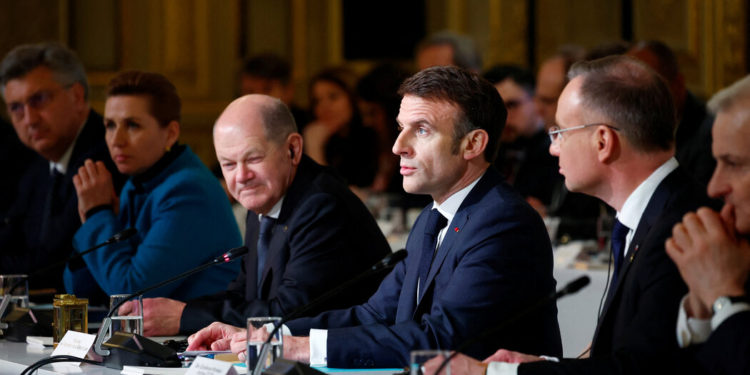By THE NEW YORK TIMES
President Emmanuel Macron of France on Monday said “nothing should be ruled out” after he was asked about the possibility of sending Western troops to Ukraine in support of the embattled nation’s war against Russia.
Mr. Macron, speaking after a meeting of European leaders in Paris to bolster support for Ukraine, stressed that the talks had not resulted in any consensus on putting troops on the ground “in an official, approved and endorsed way.”
But he insisted that “anything is possible if it is useful to reach our goal,” which he said was to ensure that “Russia cannot win this war.”
Neither the United States — which was represented at the meeting by its top diplomat for Europe, James O’Brien — nor other European leaders immediately reacted publicly to Mr. Macron’s comments. His statements were a stark departure from the usual caution that Western leaders — including Mr. Macron himself — have exercised. They have repeatedly said that they want to avoid escalating the conflict and previously ruled out sending any ground troops to Ukraine.
Ahead of the conference, Prime Minister Robert Fico of Slovakia warned on Monday that some Western countries were considering sending soldiers to Ukraine, adding that he opposed the idea. And Petr Fiala, the Czech prime minister, also disavowed this option ahead of the meeting, according to news reports.
Mr. Macron did not explicitly say which countries supported or rejected such an option, or whether France itself would consider sending troops to Ukraine, saying that he favored a “strategic ambiguity” on the issue.
“I won’t dispel the ambiguity of tonight’s debates by naming names,” he said. “I’m saying that it was mentioned among the options.”
Even though Mr. Macron provided few details about what kinds of Western forces he was referring to and why they might be sent to Ukraine now, more than two years into the war, it was the first time that he had so openly broached the possibility.
Mr. Macron’s comments reflected a growing determination among European countries to undermine Russia’s military operations in Ukraine, which Mr. Macron said is increasingly affecting Europe’s own security. Russia, he warned at the opening of the conference, could turn its sights on NATO countries.
His remarks came as Ukraine faced resistance in Washington, where Republicans in Congress are blocking badly needed financial aid.
The gathering of nearly 30 heads of state and top officials drew officials mostly from European countries, including Britain, Germany, the Netherlands, Poland and Spain.
Prime Minister Mark Rutte of the Netherlands, who expressed support for a Czech initiative to buy ammunition for Ukraine from countries around the world, said on social media after the meeting, “We know that Putin is gearing up for a long war.” He added, “We need to keep showing that we are steadfast and that time is not on his side.”
But the Dutch leader, one of the leading candidates to become the new head of NATO, did not mention sending troops to Ukraine.
Moscow has since been pressing on with attacks along the more than 600-mile front line, seizing small villages in the east and threatening to recapture land in the south hard won by Ukraine during its summer counteroffensive.
President Volodymyr Zelensky of Ukraine said on Sunday that 31,000 Ukrainian soldiers had been killed since Russia’s full-scale invasion began two years ago, acknowledging for the first time a concrete figure for Ukraine’s toll in the war. But his tally is far lower than U.S. estimates, which put the death toll about 70,000.
Military experts and Ukrainian officials say that Ukrainian troops have been hindered by a shortage of ammunition and weapons, largely the result of declining Western military assistance, and that the situation will worsen if Ukraine does not receive more support soon.
“The next few months are going to be difficult for us,” Mr. Zelensky said at a news conference in Kyiv on Sunday, noting that the political bickering in the U.S. Congress, where a $60 billion aid package to Ukraine has stalled, was undermining his country’s war effort. President Biden was expected to meet with congressional leaders on Tuesday to try to unblock the emergency aid.
“Together we must ensure that Putin cannot destroy our achievements and cannot expand his aggression to other nations,” Mr. Zelensky told the participants of Monday’s meeting by videoconference. He did not mention the possible deployment of Western troops in Ukraine.
Mr. Macron said that the participants had agreed to accelerate their efforts to send more ammunition to Ukraine’s shell-starved troops, to increase their assistance on air defense and to start a new initiative to provide Kyiv with more mid- and long-range missiles. Part of those efforts, the French leader added, could be financed by a plan proposed by Estonia to issue billions of dollars in joint European debt.
Mr. Macron insisted Europe could not rely exclusively on American support, which Europeans worry could be jeopardized by a second Trump administration. “We are very lucky to have the United States of America so committed today,” he said.
But, he added, “This is a European war.”
“Should we delegate our future to the American voter?” Mr. Macron asked. “The answer is no, whatever their vote. We mustn’t wait to find out what the result is, we must decide now.”
Aid commitments by European Union countries and institutions total close to $150 billion, more than twice the amount pledged by the United States, according to the Kiel Institute for the World Economy, a research organization.
European leaders have shown an increasing willingness to support Ukraine’s fight against Russia as the war drags on and with additional American aid in doubt. Five of them, including France, Germany and Britain, have already signed bilateral security agreements with Ukraine in an effort to deter further Russian aggression.
Mr. Macron himself — criticized earlier in the war for being too soft on Russia — has now emerged as one of Ukraine’s most vocal backers. France has provided key military equipment like Caesar self-propelled howitzers and long-range SCALP air-to-ground missiles, and Mr. Macron is also expected to visit Ukraine by mid-March.
Still, it is unclear to what extent Europe can replace the United States as the guarantor of Ukraine’s ability to fight. The Kiel Institute said that European Union members and institutions had so far allocated only half of the $150 billion pledged.
Mr. Zelensky said on Sunday that four brigades had not taken part in Ukraine’s summer counteroffensive, which failed to achieve most of its goals, because the military had not received the necessary equipment.
“Can you imagine the numbers of guys who would have fought, who couldn’t?” he asked. “The ones that had to sit and wait for the equipment they never received?”







Discussion about this post